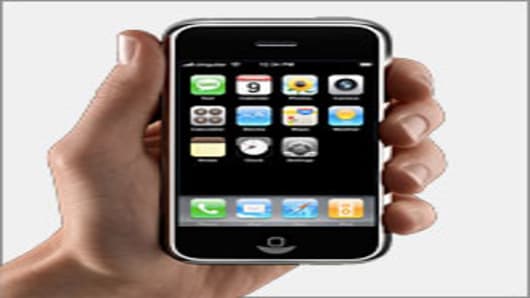No decision has been reached, Munster is quick to say, but trends and momentum might suggest an accounting change could happen sooner rather than later.
Munster released a note today, and it seems everyone seized on his analysis that a new iPhone next summer would be headed to Verizon , thus extending Apple's reach beyond the iPhone exclusivity with AT&T .
But the far more interesting part of his note addresses the potential for a change in iPhone accounting, which has annoyed Apple investors since the first iPhone was sold.
"Why does Apple use subscription accounting for the iPhone? Will that ever change?"
In short, Apple does so because it is compelled to, thanks to the Financial Accounting Standards Board. We all know the "true" affect iPhone has on Apple's numbers. Apple points this out on its conference call when it highlights the spread between its GAAP, generally accepted accounting principles, and its non-GAAP results.
And those GAAP rules mask iPhone's true and enormous impact.
What is the difference? Apple defers related iPhone revenue over the 24-month term of the typical iPhone contract, necessary because Apple offers free software updates through the phone's "useful life," says Munster. Therefore, Apple must use "subscription accounting."
A year ago, financial blogger Andy Zaky explained this well: Back then, he wrote that if Apple didn't sell another iPhone or AppleTV for the next two years, the company would still recognize almost $300 million in each of the subsequent four quarters. As of then, Apple's "war chest" held $1.170 billion in deferred revenue. Those figures have obviously ballooned since then.
Under the rules, and because of that two-year iPhone lifespan, Apple divides the sale of each device by 730 (365x2), "and recognizes the portions from that particular iPhone each day for exactly two years," says Zaky. Sell a $250 phone the day before the quarter closes and Apple gets to realize about 68 cents of a $250 sale.
But Munster reasons, "We believe several industry players (we have not confirmed Apple is one of them) and FASB with the Emerging Issue Task Force, are exploring possible amendments to the accounting rules that require subscription accounting.
If the rule goes through, we believe Apple will be able to defer the iPhone revenue in a different (and less dramatic) manner. This could meaningfully alter the reported, GAAP-based revenue numbers in future quarters and the change would likely be positive for the stock."
This is extremely important.
In its last quarterly report, Apple said it had sold 5.2 million iPhones. On a non-GAAP, adjusted basis, that would have meant $1.4 billion in revenue, which Apple does offer in its report for "clarification" way, way, way down at the bottom of the release. But doesn't really count toward the actual report because of its non-GAAP, "bastard child" status.
Apple's gross margins would have also soared, and likewise for EPS, which on a GAAP basis was $1.35, but with a FASB rule change would have mushroomed to $2.14.
Seeing those "true" numbers might have a significant impact on the way investors view the company and call much greater attention to just how profitable Apple really is.
Fact is, Apple is already enormously profitable and its balance sheet, with something like $33 billion in cash is the envy of just about any company out there. Its retail stores are gaining in revenue and foot traffic even as others languish. Its Mac business continues to show enormous gains (Apple posted its best non-holiday quarter in Mac sales ever last quarter) even as the rest of the PC industry trails.
And while analysts and investors already understand how intrinsic iPhone is to Apple's growth story, imagine for a second if the numbers they're all used to suddenly mushroomed on a GAAP basis.
If Munster's premonition holds true, an Apple change in its iPhone accounting methods might be as, if not more, significant that the release of the product itself.
CNBC.com Tech Slideshows:
--Questions? Comments? TechCheck@cnbc.com


